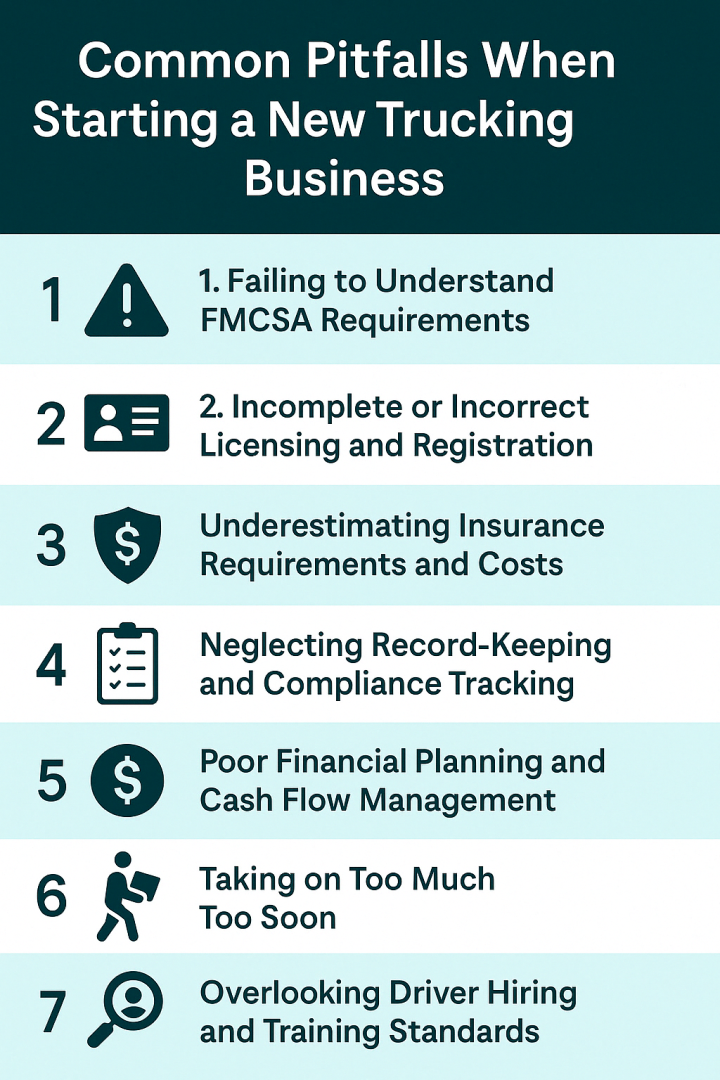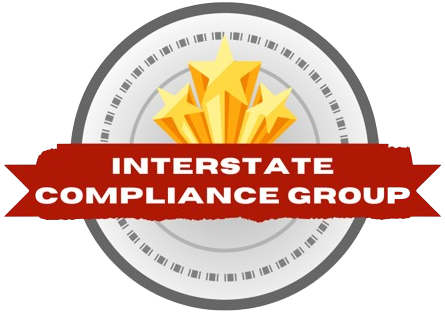Starting a new trucking business is an exciting venture—but it’s also a major responsibility. Between registering your company, complying with regulations, and managing day-to-day operations, there’s a lot that can go wrong if you’re not fully prepared. Many new trucking entrepreneurs face avoidable setbacks simply because they don’t know what to expect.
In this article, we’ll break down the most common mistakes new trucking businesses make and share actionable advice on how to steer clear of them. From compliance blunders to financial missteps, understanding these pitfalls in advance can save you time, money, and legal headaches.
Need expert help getting started? Check out the New Authority service for step-by-step assistance.
1. Failing to Understand FMCSA Requirements
The Pitfall:
Many new carriers don’t fully understand what the Federal Motor Carrier Safety Administration (FMCSA) requires to operate legally. Skipping steps or submitting incomplete forms can delay your authority or put your business at risk of shutdown.
How to Avoid It:
- Research all requirements for USDOT and MC numbers.
- Know which type of operating authority you need—freight carrier, broker, or household goods.
- Complete your BOC-3 filing, UCR registration, and insurance filings before you hit the road.
Partnering with professionals like the New Authority service ensures no step is missed.
2. Incomplete or Incorrect Licensing and Registration
The Pitfall:
Incorrect or incomplete licensing is one of the top reasons new businesses face delays. Whether it’s forgetting to file an IRP registration or not obtaining the right state permits, these oversights can keep your trucks off the road.
How to Avoid It:
- Make a checklist of all required registrations: IRP, IFTA, HVUT, and state permits.
- Double-check information before submitting applications—wrong VINs or typos can cause delays.
- Track important renewal dates so you stay compliant year-round.
3. Underestimating Insurance Requirements and Costs
The Pitfall:
New trucking businesses often underestimate how much insurance coverage is required—or how expensive it can be. Without the proper policies in place, your MC authority won’t activate.
How to Avoid It:
- Obtain at least $750,000 in liability insurance, though most brokers require $1 million.
- Don’t forget about cargo insurance, physical damage, and general liability.
- Shop around for quotes from trucking-specialized insurance providers.
Build your insurance costs into your startup budget so you’re not caught off guard.
4. Neglecting Record-Keeping and Compliance Tracking
The Pitfall:
It’s easy to focus on getting loads and forget about compliance. But poor record-keeping and lack of a compliance plan can lead to violations and audits.
How to Avoid It:
- Keep organized files for driver qualification (DQ) records, maintenance logs, and ELD reports.
- Use digital tools to track HOS, vehicle inspections, and fuel tax filings.
- Review FMCSA guidelines regularly to stay updated.
Having systems in place from the start makes ongoing compliance much easier.
5. Poor Financial Planning and Cash Flow Management
The Pitfall:
Many new trucking companies fail due to poor financial planning. Delayed payments from brokers or shippers can lead to cash flow problems if you’re not prepared.
How to Avoid It:
- Open a business bank account and separate personal finances.
- Budget for fuel, maintenance, tolls, and unexpected repairs.
- Consider freight factoring to speed up cash flow.
Creating a realistic business plan with a budget helps keep you financially on track.
6. Taking on Too Much Too Soon
The Pitfall:
Trying to expand too fast or take on long-haul contracts without proper resources can strain your business early on.
How to Avoid It:
- Start small and build experience with shorter, manageable hauls.
- Focus on quality over quantity when choosing clients and loads.
- Grow your fleet and team gradually, based on consistent income.
Scaling responsibly helps prevent burnout and long-term debt.
7. Overlooking Driver Hiring and Training Standards
The Pitfall:
Hiring inexperienced or unqualified drivers without thorough vetting can lead to safety violations and damage your business’s reputation.
How to Avoid It:
- Create a strong driver hiring process, including background checks and road tests.
- Maintain complete DQ files and ensure drivers meet medical and licensing standards.
- Provide ongoing training on HOS rules, ELD usage, and safety protocols.
A well-trained, qualified driver team is key to operational success.

Final Thoughts
Starting a new trucking business involves more than just buying a truck and hitting the road. From licensing to compliance to financial management, avoiding these common pitfalls is essential for long-term success.
If you’re feeling overwhelmed, the New Authority service can help you launch your business the right way—fully compliant and ready to roll.





